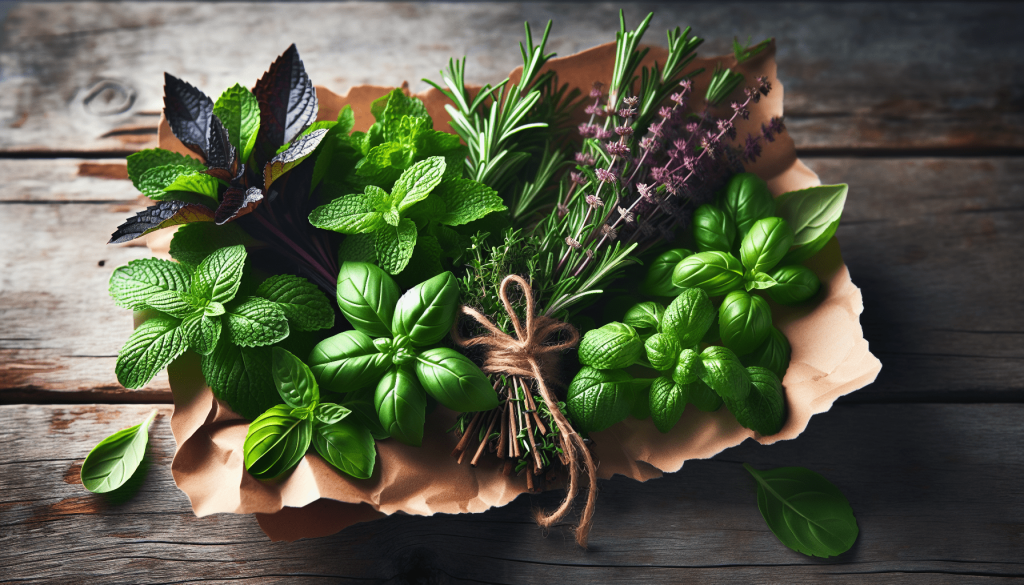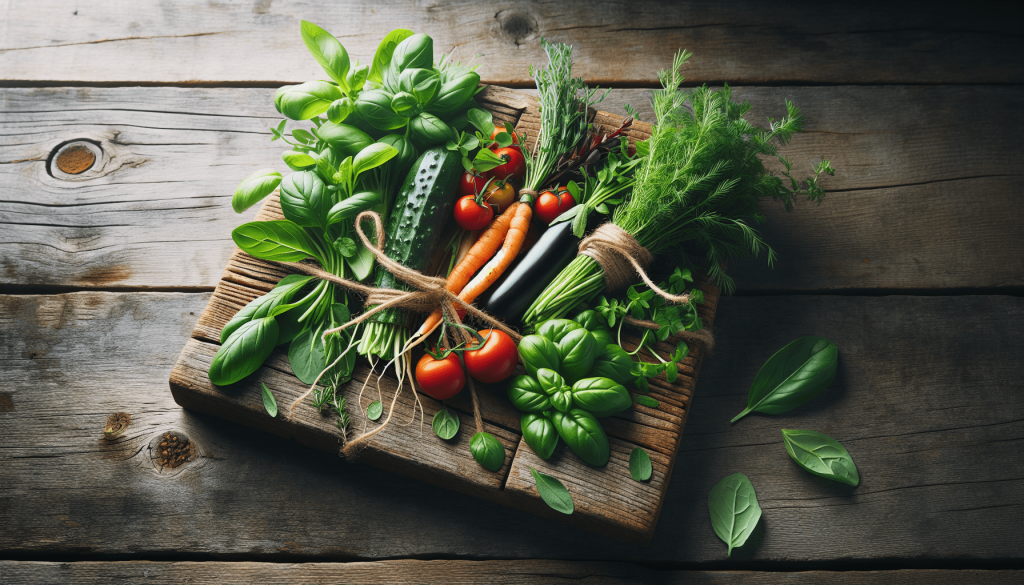You’re passionate about cooking with fresh herbs, but you always find yourself frustrated when they wilt and go bad too quickly. Fear not, because in this article, you will discover the essential tips and techniques to properly store your fresh herbs, ensuring their longevity and ensuring flavorful dishes for weeks to come. Say goodbye to wasted herbs and hello to vibrant, aromatic additions to your culinary creations.
Choosing and Buying Fresh Herbs
When it comes to choosing and buying fresh herbs, there are a few key things to keep in mind to ensure you get the best quality. First and foremost, look for herbs with fresh and vibrant leaves. Avoid any herbs that have wilted or discolored leaves, as this is a sign of age and potential decay. It’s also important to choose herbs with sturdy stems, as they indicate freshness and strength. Lastly, select herbs with a strong aroma, as this is a good indicator of their flavour and potency. By carefully considering these factors, you can ensure that you are bringing home the highest-quality and freshest herbs.
Cleaning and Drying Fresh Herbs
Now that you have chosen your fresh herbs, it’s time to give them a good clean. Gently wash the herbs under cold running water to remove any dirt or debris. Be careful not to be too rough, as delicate herbs can easily bruise. After washing, gently pat the herbs dry with a clean kitchen towel or paper towels. It’s important to remove excess moisture from the herbs to prevent spoilage. Once you have removed most of the moisture, let the herbs air dry for a few minutes before proceeding to the next step.

Removing Leaves from Stems
When it comes to using fresh herbs in your cooking, you’ll often need to remove the leaves from the stems. To do this, hold the stem with one hand and, with the other hand, run your fingers along the stem in the opposite direction of the leaves. This will allow the leaves to easily come off while leaving the stem intact. Alternatively, you can use a sharp knife or kitchen scissors to remove the leaves from the stems. Simply hold the stem and carefully cut or snip away the leaves. Make sure to discard any discolored or damaged leaves, as they may affect the overall quality and flavor of your herbs.
Storing Fresh Herbs in the Refrigerator
Properly storing fresh herbs is essential to prolong their freshness and flavor. To store your herbs in the refrigerator, begin by placing them in a resealable plastic bag. Leave a small opening in the bag to allow for air circulation. Next, wrap the herbs loosely in a damp paper towel. This will help maintain moisture and prevent the herbs from drying out. Finally, store the bag of herbs in the crisper drawer of your refrigerator. It’s important to periodically check and replace the paper towel if it becomes damp or discolored. By following these steps, you can keep your fresh herbs fresh for as long as possible.

Freezing Fresh Herbs
If you have an abundance of fresh herbs and want to extend their shelf life, freezing is a great option. To freeze fresh herbs, start by rinsing them thoroughly and drying them well. Make sure to remove any excess moisture from the herbs, as ice crystals can affect their texture and flavor. Once dry, you have the choice of chopping the herbs into small pieces or leaving them whole. Both methods can work well depending on your personal preference and how you plan to use the herbs later. Place the herbs in an airtight container or freezer bag and label it with the herb name and the date. This will help you keep track of what herbs you have frozen and how long they have been stored. When you’re ready to use the herbs, simply take out the desired amount and thaw them in the refrigerator or add them directly to your dish while still frozen.
Storing Fresh Herbs in Oil
Another method for storing fresh herbs is to store them in oil. This can help preserve their flavors and keep them accessible for future use. To store herbs in oil, begin by washing and drying the herbs thoroughly. Make sure they are completely dry to prevent any water from spoiling the oil. Next, remove the leaves from the stems. Place the herbs in a clean jar and cover them with olive oil or another neutral oil of your choice, ensuring that the herbs are fully submerged. This oil will help preserve the herbs and also take on their flavors over time. Make sure to seal the jar tightly to prevent any air from spoiling the oil. Store the jar in a cool, dark place to maintain the freshness of the herbs. When you’re ready to use the herbs, you can simply scoop them out of the oil and add them to your dishes.
Drying Fresh Herbs
Drying herbs is a popular preservation method that allows you to enjoy your fresh herbs for months to come. To dry fresh herbs, gather a bunch of herbs and tie the stems together with kitchen twine. Hang the herbs upside down in a well-ventilated area away from direct sunlight. This will allow the herbs to dry evenly and retain their flavors. It’s important to choose a location where the herbs won’t be disturbed and can have proper airflow. Allow the herbs to dry for about 1-2 weeks, or until they are brittle and crumble easily when touched. Once dried, remove the leaves from the stems and store them in an airtight container in a cool, dark place. Dried herbs are a great addition to various dishes and can be used in your cooking whenever you need a burst of flavor.
Storing Fresh Herbs in Water
Storing fresh herbs in water is a simple and effective way to prolong their freshness. Begin by trimming the ends of the herb stems, removing any discolored or damaged parts. Place the herbs in a glass or jar filled with a couple of inches of water, making sure that the stems are submerged in the water. This water will help keep the herbs hydrated and prevent them from wilting. To retain moisture, cover the herbs with a plastic bag or wrap. It’s important to change the water every few days to prevent any bacterial growth. By storing fresh herbs in water, you can ensure that they stay fresh and vibrant for a longer period of time.
Storing Fresh Herbs in the Freezer with Oil
If you prefer to store your fresh herbs in the freezer with the addition of oil, this method can be a convenient option. Begin by washing and drying the herbs thoroughly, making sure to remove any excess moisture. Next, remove the leaves from the stems. Place the herbs in an ice cube tray, filling each compartment halfway with the herbs. Then, fill the remaining space with olive oil or melted butter. This method allows you to portion the herbs according to your needs. The oil or melted butter will help preserve the herbs and prevent any freezer burn. Once frozen, transfer the herb cubes to an airtight container or freezer bag and label it with the herb name and date. This method is especially useful when you want to add a burst of flavor to your dishes in a convenient way. Simply take out a herb cube and add it to your cooking or sauté it directly in a pan.
Reviving Wilting Herbs
Even with the best of intentions, sometimes fresh herbs can become wilted. If you find yourself with wilting herbs, there’s no need to worry. There are a few simple steps you can take to revive them and bring them back to life. Start by trimming the ends of the stems, removing any discolored or damaged parts. Then, place the herbs in a glass or jar of cold water, making sure the stems are submerged. Store the herbs in the refrigerator for a couple of hours to allow them to absorb the water and regain their freshness. After a few hours, gently pat the herbs dry with a clean kitchen towel before using them in your dishes. This process can help revive your wilting herbs and ensure that you can still enjoy their flavors and aromas.
Properly storing fresh herbs is essential to maintain their quality and flavor. By following these tips, you can ensure that your herbs stay fresh for longer periods, allowing you to enjoy their vibrant flavors in all your culinary creations. Whether you choose to store them in the refrigerator, freezer, oil, water, or dry them, each method has its own benefits and can suit different needs and preferences. So next time you bring home a bunch of fresh herbs, remember these guidelines and your herbs will thank you, providing delicious aromas and flavors for your cooking adventures.
